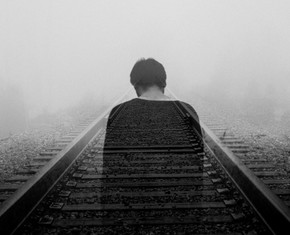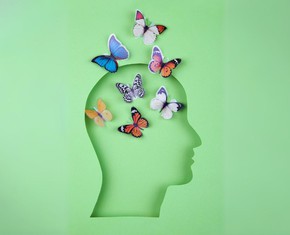The views expressed in our content reflect individual perspectives and do not represent the authoritative views of the Baha'i Faith.
Have you ever been mistaken for someone else and wondered if you had a twin somewhere? That happened to me, and it was a spine-chilling experience since I was mistaken for my great-grandfather.
That strange encounter occurred when my wife and I went to Norway, the land of my ancestors, to see if we could find the homestead where my great-grandparents once lived. I had always wanted to explore my roots, and as a third-generation American, most of what I knew about my background came from my Norwegian immigrant grandparents, who didn’t talk about the old country much, preferring instead to assimilate.
RELATED: The Spiritual Metaphors of the Prism, the Mirror, and the Sun
When we traveled to Norway, I took an old diary of my grandfather’s along. It generally described the area where my ancestors had lived, and we tried to find that exact place. We flew from Oslo to the little Norwegian town of Nesna, on the Arctic Circle, and met some distant but very welcoming second and third cousins there — but they had no idea where my great-grandparents had lived. So we rented a car and took a ferry and drove until a rocky, windswept area stretch of land across from a fjord seemed like it might match my grandfather’s description.
I decided to knock on the door of a lone house near the fjord, with no idea about what I’d find. A very old man answered the door, peered at me intently, then, before I could say a word, his eyes widening in shock, he pointed at me and yelled my great-grandfather’s name.
A chill ran up my spine.
He spoke no English and I spoke no Norwegian, but it turned out that his 85-year-old younger brother could translate — and I learned that he remembered my long-departed great-grandfather from the time when the old man had been a small boy. I also learned that my great-grandparent’s homestead was right there on their land, and my wife and I walked through it in amazement.
I have never seen a photograph of my great-grandfather, but apparently, we look exactly alike — which made me think about the idea of reincarnation. If you’re fortunate enough to have pictures of your own ancestors, you may have had this so-called “doppelganger” or “lost twin” experience or something like it. “Why, you look just like your great-aunt Martha!” some relative might’ve said, and sure enough, when you look at the picture, you can see a very strong resemblance. Or, alternatively, you may have seen another person who resembles you or someone you know in a striking way — a so-called “twin stranger.” Does this mean that reincarnation actually happens?
No.
Why not? Because science has definitively established that no two human beings — even identical twins — are exactly alike. While you might strongly resemble one of your ancestors and even share a great deal of DNA with your siblings, every organism in nature is unique. It’s a proven fact — human beings share 99.9 percent of our DNA with one another, but the diverging order that DNA is arranged in and our environment’s impact on us, creates our individual differences.
The Baha’i teachings make this important point repeatedly, as in this clarifying passage from Abdu’l-Baha’s Some Answered Questions:
… observe that in the sensible world the divine appearances are not repeated, for no created thing can be identical with another in every way. The sign of Divine Unity is present and visible in all things. If all the granaries of the world were filled with grain, you would be hard-pressed to find two grains that are absolutely identical and indistinguishable in every respect: Some difference or distinction is bound to remain between them. Now, as the proof of the Divine Unity exists within all things, and the oneness and singleness of God is visible in the realities of all beings, the recurrence of the same divine appearance is in no wise possible. Therefore reincarnation, which is the repeated manifestation in this world of the same spirit with its former essence and conditions, would be the selfsame appearance and is thus impossible. And since the recurrence of the same divine appearance is impossible for material beings, the repeated assumption of the same station, whether on the arc of descent or on the arc of ascent, is likewise impossible for spiritual beings, for the material world corresponds to the spiritual world.
When I was a student, I had two friends who were identical twins. No one but their parents could tell them apart. One day, though, curious about all of their remarkable similarities, I asked if they had the same fingerprints. Both girls held up their right hands for comparison — and sure enough, I could clearly see that their fingerprints were different.
RELATED: Comparison: the Thief of Joy
Scientists and physicians used to believe that identical twins (called monozygotic because they originally come from a single split zygote) also had identical DNA — but now further investigation has proven that’s not true. Even identical twins aren’t identical.
We’re all unique.
Isn’t that reassuring? No one like you has ever existed before or will ever exist again. Each of us has a completely individual body, mind, and soul, unlike any other person who has ever lived.
This clearly means that reincarnation, as the Baha’i teachings say, cannot possibly exist either physically or spiritually:
Thus it is in no wise possible to attain existence through returning: It is as if man, after being freed from the world of the womb, were to return to it. Consider how unfounded the conceptions of the reincarnationists and transmigrationists are! They conceive of the body as a vessel and the spirit as its contents, like water and cup, with the water being emptied from one cup and poured into another. This is indeed a childish notion: They do not reflect deeply enough to realize that the spirit is an entirely incorporeal thing, that it does not enter or exit, and that, at most, it is connected with the body as the sun is with the mirror. If the spirit could indeed traverse all the degrees and attain to essential perfection by repeatedly returning to the material world, then it would have been better if God had prolonged the life of the spirit in this material world in order for it to acquire virtues and perfections, and hence there would be no need for it to taste of the cup of death and enter this life a second time.
















Comments
Sign in or create an account
Continue with Googleor